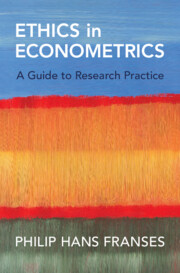Book contents
- Ethics in Econometrics
- Ethics in Econometrics
- Copyright page
- Contents
- Figures
- Tables
- Preface
- Acknowledgments
- Recommended Reading
- Introduction
- 1 Ethical Guidelines
- 2 Scientific Misconduct
- 3 Influential Observations
- 4 Model Selection
- 5 Estimation and Interpretation
- 6 Missing Data
- 7 Spurious Relations
- 8 Blinded by the Data
- 9 Predictability
- 10 Adjustment of Forecasts
- 11 Big Data
- 12 Algorithms
- Conclusion
- Index
- References
2 - Scientific Misconduct
Published online by Cambridge University Press: 14 November 2024
- Ethics in Econometrics
- Ethics in Econometrics
- Copyright page
- Contents
- Figures
- Tables
- Preface
- Acknowledgments
- Recommended Reading
- Introduction
- 1 Ethical Guidelines
- 2 Scientific Misconduct
- 3 Influential Observations
- 4 Model Selection
- 5 Estimation and Interpretation
- 6 Missing Data
- 7 Spurious Relations
- 8 Blinded by the Data
- 9 Predictability
- 10 Adjustment of Forecasts
- 11 Big Data
- 12 Algorithms
- Conclusion
- Index
- References
Summary
In this chapter we discuss a few cases of scientific misconduct that turned out easy to spot, given some basic knowledge of statistics. We learn that it is always important to begin with a close look at the data that you are supposed to analyze. What is the source of the data, how were they collected, and who collected them and for what purpose? Next, we discuss various specific cases where the misconduct was obvious. We see that it is not difficult to create tables with fake regression outcomes, and that it is also not difficult to generate artificial data that match with those tables. Sometimes results are too good to be true. Patterns in outcomes can be unbelievable. We also see that it is not difficult to make the data fit better to a model. These are of course all unethical approaches and should not be replicated, but it is good to know that these things can happen and how.
Information
- Type
- Chapter
- Information
- Ethics in EconometricsA Guide to Research Practice, pp. 34 - 53Publisher: Cambridge University PressPrint publication year: 2024
